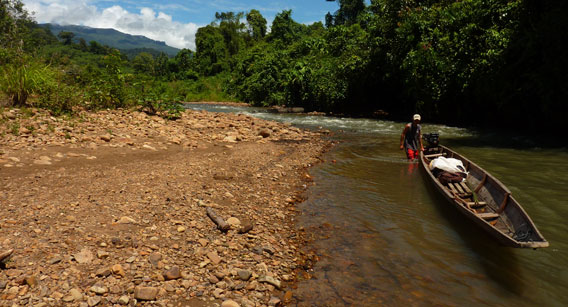
Traveling on the Kerong River with the Penan. Photo courtesy of Gavin Bate.
News about the Penan people is usually bleak. Once nomadic hunter-gatherers of the Malaysian state of Sarawak on Borneo, the indigenous Penan have suffered decades of widespread destruction of their forests and an erosion of their traditional culture. Logging companies, plantation developments, massive dams, and an ambivalent government have all played a role in decimating the Penan, who have from time-to-time stood up to loggers through blockades, but have not been successful in securing recognition of legal rights to their traditional lands. Allegedly a number of Penan leaders have been murdered for their opposition to loggers, many have been imprisoned, and there are reports of Penan girls being sexual abused by loggers. Yet even as the Penan people struggle against the destruction of their homelands, they are not standing still. Several Penan villages have recently begun a large-scale reforestation program, a community tourism venture, and proclaimed their a portion of their lands a “Peace Park.”
“In 2009, 17 Penan villages in the Upper Baram declared the opening of the Penan Peace Park—a 163,000 hectare area of primary and secondary forest that the communities have agreed will be put aside and kept free from large scale intensive logging and conversion to oil palm plantation,” Gavin Bate, director of Adventure Alternative and its charitable arm Moving Mountains Trust, told mongabay.com. “These are forests that should be part of the trans-boundary World Wildlife Fund imitative Heart of Borneo—the biggest trans-boundary conservation initiative in the world. Whether this happens or not remains to be seen.”
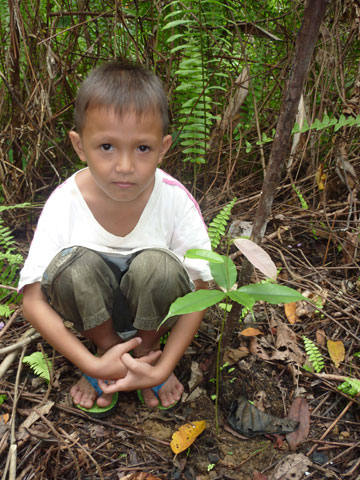 Penan child next to 3-week-old Kapor species. Photo courtesy of: Gavin Bate. |
To date the Sarawak government has refused to recognize the Penan Peace Park, and the Penan continue to fight to keep the area free from loggers. Yet even as they are trying to protect their homelands, the Penan are also restoring degraded lands. Following a devastating fire in 1998, the Penan began a reforestation program with funding from Bate’s organization, Moving Mountains Trust. The Penan gathered seeds during a mass fruiting event in 2009 and have made swift progress since then.
“By the end of 2011 nearly 14,000 trees will have been planted by two villagers numbering little over 200 people. Initial bewilderment by the majority within the communities (‘we are surrounded by trees, why would we want to plant more?’) has now been replaced by a great sense of pride and realization that the program has long term benefits both financially and culturally,” Bate says.
The reforestation program is also meant to “provide a clear message to companies that wish to intrude on traditional lands that not only do the communities wish to have their forests remain intact but that they are willing to plant new trees whilst everywhere else is still being felled,” explains Bate.
Meanwhile the Penan of the Upper Baram have also started a small-scale community tourism program.
“Loosely termed Picnic With The Penan. At present the [tourism] program features 5 villages but it is hoped as interest grows so will the number of villages involved,” Bate says, who adds that adventurous tourists will experience “a truly authentic and fascinating glimpse into the lives of the original jungle dwellers, and a chance to see with your own eyes the effect of indiscriminate logging on the countryside and the people who live in it. The chance to do something personal to benefit a program that is tackling the problem for these people.”
Although the Penan have not won yet the big battles for their land or even their survival, they are showing once again that they intend to determine their own fate, free from the authority of hostile companies and government.
In a December 2011 interview Gavin Bate discusses the history of the Penan, their struggle against exploitation, and new initiatives that may make their future brighter. Bate and mongabay.com would also like to thank all the community members of the project that have given their time for this interview.
INTERVIEW WITH GAVIN BATE
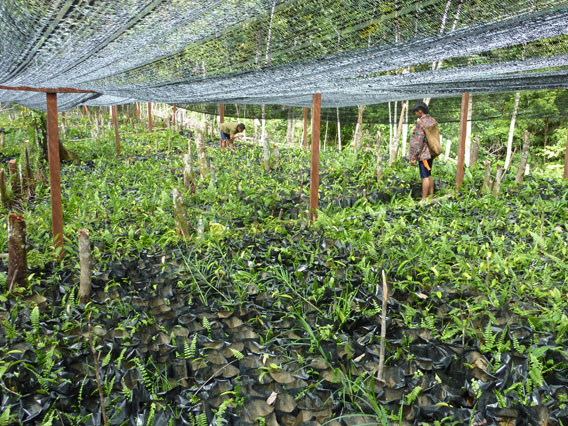
Reforestation nursery. Photo by: Gavin Bate.
Mongabay: Will you tell us about the history of the Penan people in Sarawak?
Gavin Bate: The Penan are one of the true original indigenous nomadic inhabitants of Borneo, the third largest island in the world. The Penan now found in Sarawak are believed to have migrated West over the main central mountain ranges in their desire to escape their more aggressive “headhunting” neighbors. They are now split into the Eastern and Western Penan who differ to a degree culturally and linguistically.
Mongabay: What makes the Penan of the Upper Baram unique?
Gavin Bate:The Penan of the Upper Baram were still nomadic until the missionaries began arriving in the early 1960s and even to this day still spend large amounts of time in the forest, hunting and collecting important edible foods and medicinal plants. Recognizing the importance of their forests to their future health, wealth and marginalized culture, the communities have so far managed to keep large swathes of their traditional lands intact despite the wholesale destruction over other areas of Borneo island.
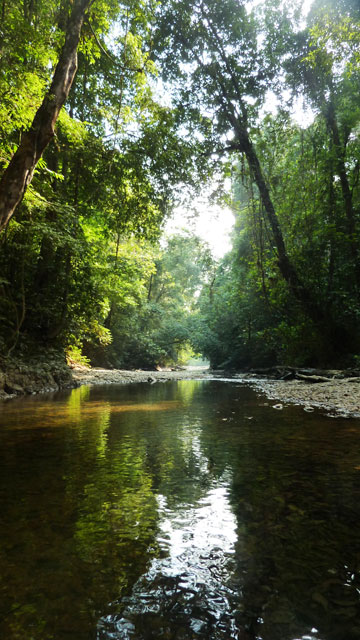 Penan rainforest. Photo courtesy of: Gavin Bate. |
As one Penan elder described: “As nomadic hunter-gatherers, we Penan people have been roaming the rainforests of the Upper Baram region for centuries. Even though we have settled down and started a life as farmers since the late 1950s, we still depend on the forests for our food supply, for raw materials such as rattan for handicrafts, for medicinal plants and for other jungle products. Our entire cultural heritage is in the forest and needs to be preserved for future generations.”
Mongabay: How have these Penan managed to keep loggers and other developers off of their land?
Gavin Bate: Large scale logging operations arrived in the Upper Baram 20 years ago. With the foresight of a number of village elders it was agreed that those villages willing should join together and when and where necessary “blockade” logging access roads with human barriers. These blockades could last months and some of those involved suffered imprisonment and punishment at the hands of the authorities. Seeking to bring attention of their plight to the outside world the communities enlisted a number of overseas organizations to increase media attention of their issues.
With improvements in technology in the last 10 years, the traditional lands still not legally recognized by the state government have been extensively mapped marking important burial sites and other areas of historical and cultural significance. It is hoped these maps will ultimately prove their lands to be theirs and remove the notion of “terra nullius” that presently exists.
In 2009 17 Penan villages in the Upper Baram declared the opening of the Penan Peace Park—a 163,000 hectare area of primary and secondary forest that the communities have agreed will be put aside and kept free from large scale intensive logging and conversion to oil palm plantation. These are forests that should be part of the trans-boundary World Wildlife Fund imitative Heart of Borneo—the biggest trans-boundary conservation initiative in the world. Whether this happens or not remains to be seen.
As such, these forests, despite some hunting pressures, are still rich in many of the key Borneo flora and fauna species such as orangutan, gibbon and clouded leopard. There has been little scientific study of these remote forests and mountains and there remains the distinct possibility of new species to science being discovered.
Most recently, the efforts of these communities has been recognized by the establishment of a new community tourism program. Loosely termed Picnic With The Penan. At present the program features 5 villages but it is hoped as interest grows so will the number of villages involved.
These villages have formed KOPPESS—(Komunity Operation program of the Penan of the Upper Selungo river). From the outset KOPPESS has received valuable support and assistance from members of the Mescot organization in Sabah. Mescot have given their time and expertise for free to assist what they view as their sister program in Sarawak.
Mongabay: Will you tell us about the reforestation program?
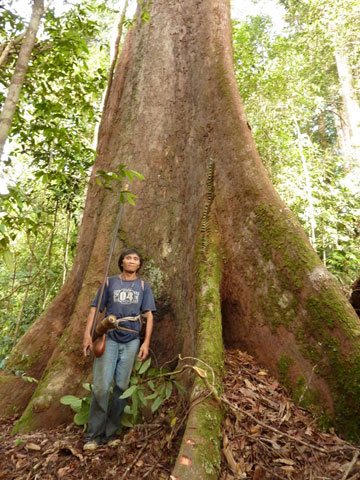 Penan next to mature tree. Photo courtesy of: Gavin Bate. |
Gavin Bate: The immediate areas around the villages and also further afield in previous virgin forest were badly affected by the great fires of the 1998 El Nino phenomena that spanned the whole of Southeast Asia. Large swathes of generally secondary forest were destroyed and left devoid of any “mother” host trees. Left in this condition it would be decades before the forests could hope to recover by natural means.
In late 2009 it was observed that the Ulu Baram area was about to experience one of the rainforests synchronous mast fruiting phenomena’s. The exact science of this massive fruiting of the dipterocarp and other tree species is still unknown, but the results of this process are that there are thousands upon thousands of of easily collectable high quality primary forest seeds.
As such this mast fruiting was seen as an opportunity that was too simply good to pass by—it would have been another 6-10 years before another such opportunity would maybe come.
Initial funding was sought and fortuitously found quickly for the first three years via our organization called Moving Mountains. Moving Mountains is the charitable arm of our UK adventure travel company called Adventure Alternative. It was timely that Moving Mountains was actively seeking a tropical rainforest project to augment its existing mountain and desert/savannah programs in Nepal and Kenya.
Agreed payment rates for collecting, nursing and planting the seeds were agreed within the community.
The mid-term goal (15-20 years) of the program is to provide the villages with easy access to timber required for their own personal needs and thus ensuring that the increasingly rare and truly ancient old growth forests they are the custodians of remain free from extraction pressure or lures for generations to come.
From the outset valuable advice and planning was provided by Mescot who themselves are now regarded as pioneers in reforestation along their Kinabatangan riverine location.
The first three months was spent collecting 20,000 plus seeds from the nearby forests and transplanting them to the newly built nurseries for germination. There were some initial mistakes and setbacks which resulted in the non germination of around 5,000 seeds but these were replaced. By the end of 2011 nearly 14,000 trees will have been planted by two villagers numbering little over 200 people. Initial bewilderment by the majority within the communities (“we are surrounded by trees, why would we want to plant more?”) has now been replaced by a great sense of pride and realization that the program has long term benefits both financially and culturally. It is hoped that in the longer term the old and new forests that the communities guard can be recognized on a global level for their global carbon worth.
Mongabay: Where do the seeds come from? What species are important?
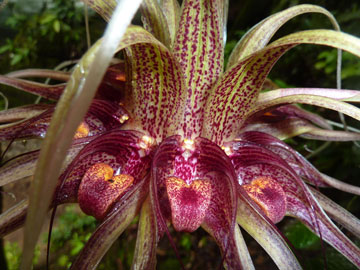 An unknown orchid in the Penan rainforest. Photo courtesy of: Gavin Bate. |
Gavin Bate: All the seeds have been collected from the nearest primary/host forests to the village. The majority of the species planted have been Kapor, Meranti and a smaller number of other Shorea species.
Mongabay: How is tree-planting progressing? What are the future plans for this reforestation?
Gavin Bate: By September 2011, approximately 12,000 new trees had been planted and the trial plots from December 2010 are showing growth of more than 2 meters in 10 months and a very encouraging mortality rate of only 5-10 percent—this can sometimes be as high as 50 percent. By the end of 2011 number of trees planted should rise to 14,000. Simultaneously new saplings from the forest will be collected and nurtured in the tree nurseries in readiness for 2012 planting—it is hoped to achieve 20,000 planted out for 2012.
If funding can be found the project may be extended to other villages. It is also hoped to increase the number of species and introduce other income valuable forest products such as coffee, resins and vanilla.
It is hoped that the KOPPESS reforestation program will prove to be the first long-term sustainable one in Sarawak and provide a clear message to companies that wish to intrude on traditional lands that not only do the communities wish to have their forests remain intact but that they are willing to plant new trees whilst everywhere else is still being felled.
Mongabay: The Penan in the region has also begun a small-scale tourism venture. How will this help the community?
Gavin Bate: It will ensure that they become stakeholders in an enterprise that will bring them revenue and a route to market, and in the future give them a potential to have a sustainable form of income to the co-operative which will enable them to invest in the projects currently funded by a charity. Commerce to support development for long term aims is the overall vision.
Mongabay: What can travelers expect when they stay with the Penan?
Gavin Bate: A truly authentic and fascinating glimpse into the lives of the original jungle dwellers, and a chance to see with your own eyes the effect of indiscriminate logging on the countryside and the people who live in it. The chance to do something personal to benefit a program that is tackling the problem for these people.
Mongabay: How can the general public help Sarawak’s Penan people?
Gavin Bate: By supporting Moving Mountains Trust and donating to a charity which has the infrastructure in place, and access to the right people in-country, to ensure that funds go to the project without any administrative costs and without any loss to the program.
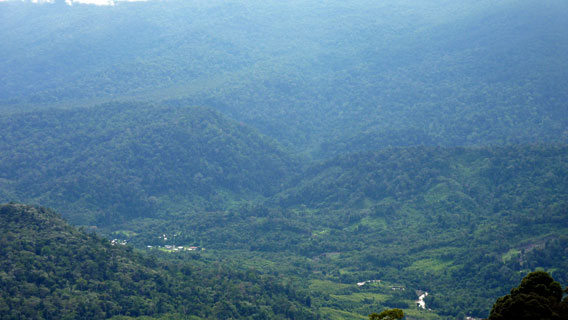
The Penan’s blockaded rainforest. Photo courtesy of: Gavin Bate.
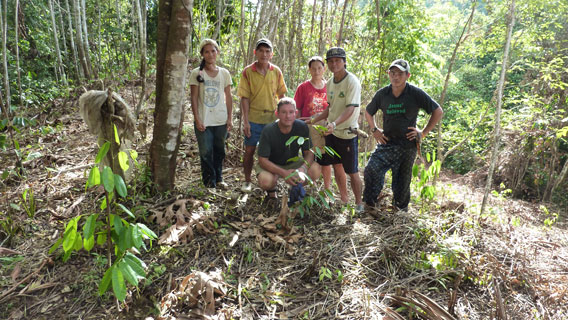
Penan with tourist planting tree. Photo courtesy of: Gavin Bate.
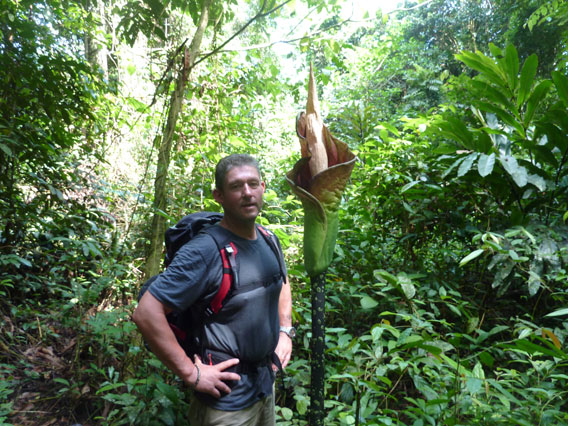
Tourist poses with unique plant in Penan rainforest. Photo courtesy of: Gavin Bate.
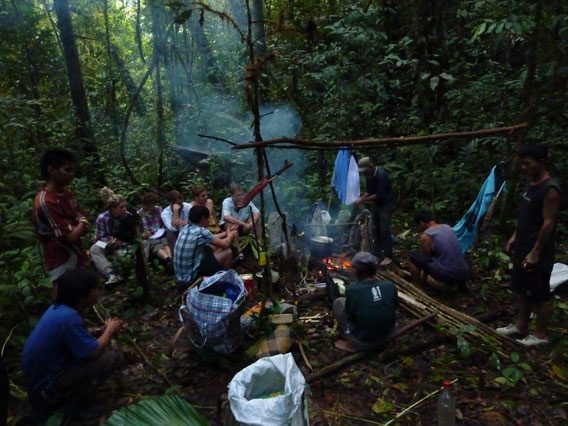
A true picnic with the Penan. Photo courtesy of: Gavin Bate.
Related articles
NGOs call for arrest of Malaysian leader for corruption, money laundering
(12/12/2011) A coalition of Malaysian and international NGOs are calling for the arrest of Sarawak chief minister Abdul Taib Mahmud and 14 family members for alleged abused of power, corruption, and money laundering, reports the Bruno Manser Fund, a group that has signed the letter urging action.
Malaysian court blocks rainforest tribes’ fight against mega-dam in Borneo
(09/09/2011) Indigenous tribes in Borneo suffered a stinging defeat Thursday after Sarawak’s highest court ruled against them in 12-year-long legal battle. Tribal groups had challenged the Malaysian state government for seizing indigenous lands in order to build a massive hydroelectric power plant, dubbed the Bakun dam, but the three-person top court found unanimously against the tribes.
Wikileaks: US warned of severe corruption in Malaysia’s Sarawak state
(08/30/2011) U.S. government sources characterize the ruler of Malaysia’s Sarawak as ‘highly corrupt’ and plagued with conflicts of interest, according to secret cables released today by Wikileaks.
Rainforest tribe forcibly removed from dam area to palm oil plantation
(06/23/2011) A thousand Penan indigenous people have been forcibly moved from their rainforest home to monoculture plantations, reports Survival International. To make way for the Murum dam, the Malaysian state government of Sarawak is moving a thousand Penan from their traditional homes, but as apart of the deal the government promised to move the Penan to another part of their ancestral land. The government has since sold that land to a palm oil company, which is currently clearcutting the forests for plantations.
Embattled Malaysian minister denies secret Swiss accounts, but not other holdings
(06/22/2011) Abdul Taib Mahmud, chief minister of Sarawak, on Wednesday denied charges that he holds secret Swiss bank accounts containing wealth attained through close ties with logging companies and palm oil firms operating in the Malaysian Borneo state, reports the Associated Press.
Sarawak’s leader under investigation for corruption linked to logging
(06/10/2011) After months of heavy campaigning by human rights organizations and environmental group, the Malaysian Anti-Corruption Commission’s (MACC) announced it is investigating Sarawak Chief Minister Abdul Taib Mahmud for corruption.
Report: corruption in Sarawak led to widespread deforestation, violations of indigenous rights
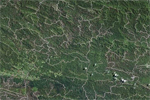
(03/10/2011) At the end of this month it will be 30 years since Abdul Taib Mahmud came to power in the Malaysian state of Sarawak. Environmentalists are using the occasion, along with new revelations, to highlight corruption and nepotism they say have characterized his regime. Chief Minister Taib and his decades-long administration are no strangers to such allegations, but a new report from the indigenous-rights group Bruno Manser Fund (BMF)—amid criticism from independent media sources, such as Sarawak Report and Radio Free Sarawak—are adding fuel to the fire. Most recently, the report describes in great detail how the tropical timber trade in Sarawak has undercut indigenous groups while toppling some of the world’s greatest rainforests, all at the expense of the Sarawak people.
Sarawak government mocks its indigenous people
(02/20/2011) The Sarawak government mocked the plight of its rainforest people in a press release issued earlier this month, says a rights’ group.
Sarawak’s last nomad: indigenous leader and activist, Along Sega, dies

(02/03/2011) Along Sega never knew exactly how old he was, but when he passed away yesterday in a hospital far from the forest where he born, he was likely in his 70s. Leader among the once-nomadic hunter and gatherer Penan people of Borneo and mentor to Swiss activist, Bruno Manser, Along Sega will be remembered for his work to save the Penan’s forest—and their lifestyle and culture—from logging companies, supported by the Sarawak government and provided muscle by the state police.
Violence at indigenous logging blockade in Borneo
(06/21/2010) A road blockade organized by Penan tribesmen in Malaysian Borneo turned violent over the weekend when a timber company official allegedly struck a native protester, reports the Bruno Manser Fund. Malaysian state police, who arrived in logging company vehicles, subsequently told the Penan to dismantle their blockade, which was established to protest continued logging of rainforest lands.
Rainforest tribe sues the Malaysian government for enabling deforestation
(12/10/2009) Five Penan rainforest communities are suing the Sarawak state government and the Malaysian timber giant Samling for violation of their native customary rights, reports the Bruno Manser Fund, a group that works on behalf of indigenous groups in Malaysia.
Malaysian land minister attacks credibility of young indigenous rape victims
(12/07/2009) Speaking to the BBC, James Masing, Sarawak Minister for Land Development, dismissed claims by Penan girls and women who said they had been sexually abused and raped by logging workers in a remote jungle area.
Rainforest tribe declares ‘peace park’ to defend lands from logging in Sarawak
(11/30/2009) In an attempt to block destructive logging of their traditional land, a group of indigenous Penan has declared a “peace park” in the Upper Baram region of Sarawak in Malaysian Borneo, reports the Bruno Manser Fund.
Independent review finds logging company has abused rights of indigenous Penan in Borneo

(09/15/2009) An independent review of Interhill Logging found that the Sarawak logging company has regularly violated forest laws and abused the rights of the indigenous Penan peoples. The review, conducted by French tourism giant ACCOR, found that Interhill Logging had not received free, prior, and informed consent from the local Penan people for its logging operations; the logging being done by Interhill “is very definitely not sustainable”; the company is not fully compiling with Sarawak’s Natural Resources and Environment Board; and Interhill is providing no long-term benefits to the Penan peoples.